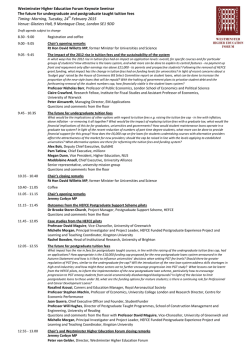
Tuition Benefits for Immigrants - National Conference of State
Tuition Benefits for Immigrants July 21, 2015 Twenty states offer in-state tuition to unauthorized immigrant students, 16 by state legislative action and four by state university systems. Sixteen state legislatures—California, Colorado, Connecticut, Florida, Illinois, Kansas, Maryland, Minnesota, Nebraska, New Jersey, New Mexico, New York, Oregon, Texas, Utah and Washington—enacted laws to allow in-state tuition benefits for certain unauthorized immigrant students. These laws typically require attendance and graduation at state high schools, acceptance at a state college or university, and promising to apply for legal status as soon as eligible. At least four state university systems—the University of Hawaii Board of Regents, University of Michigan Board of Regents, Oklahoma State Regents for Higher Education and Rhode Island’s Board of Governors for Higher Education—established policies to offer in-state tuition rates to unauthorized immigrant students. In 2014, Tennessee and Florida enacted legislation that extends in-state tuition to U.S. citizen students who are dependents of unauthorized immigrants. In 2015, Connecticut reduced the number of high school years an unauthorized student must attend in the state from four to two. Utah provided an exemption to verification of lawful presence for privately funded scholarships administered by colleges or universities. Missouri barred in-state tuition and scholarships to students with unlawful immigration status. Five states—California, New Mexico, Minnesota, Texas and Washington—offer state financial assistance to unauthorized students. Several states, including Utah, allow public universities to use private sources of funding to support financial aid to unauthorized immigrant students. Six states—Alabama, Arizona, Georgia, Indiana, Missouri and South Carolina—bar unauthorized immigrant students from in-state tuition benefits. www.ncsl.org/immig | 1 State Bill Year Summary STATES OFFERING IN-STATE TUITION THROUGH STATE LEGISLATION California A 540 2001 Colorado S 33 2013 Connecticut H 6390 2011 H 6844 2015 H 851 2014 Florida This law requires that an unlawful immigrant, other than a nonimmigrant alien, be exempted from paying nonresident tuition at state community colleges and the state university if these conditions are met: attendance at a state high school for three or more years, graduation from a California high school or the equivalent, registration at or attendance at an accredited higher education institution in the state, and has filed an affidavit stating that the student has applied to legalize his or her immigration status, or will file an application as soon as he or she is eligible. This law allows students without lawful immigration status to be considered in-state residents and exempts people receiving higher education benefits from having to provide documentation of lawful presence in the United States. This law extends in-state tuition benefits to postsecondary students without legal immigration status who reside in Connecticut and meet certain criteria. It requires them to file an affidavit with a college stating that they have applied to legalize their immigration status or will do so as soon as they are eligible to apply. Amends existing law related to requirements for residents, other than certain nonimmigrant aliens, to be classified as an in-state for tuition purposes. Students must have completed at least two years of high school in the state, rather than the previous four year requirement. This postsecondary education law includes amendments relating to qualifications for resident (instate) tuition. Out-of-state fees are waived for students, including but not limited to those undocumented for federal immigration purposes who have attended a secondary school for three years before graduating from a Florida high school, applied for higher education enrollment within two years of graduation, and submitted an official Florida high school transcript as evidence of attendance and graduation. A dependent child who is a United States citizen may not be denied classification as a resident for tuition purposes based solely upon the immigration status of his or her parent. The law prohibits denial of classification as a resident for tuition purposes based on immigration status and allows certain people to be classified as state residents based on marriage or military service. Illinois H 60 2003 Kansas H 2145 2004 Maryland S 167 2011 Minnesota S 1236 2013 Nebraska L 239 2006 New Jersey S 2479 2013 New Mexico S 582 2005 New York S 7784 2001 This law allows in-state tuition for a person who is not a citizen or permanent resident of the United States who files an affidavit stating intent to apply for citizenship as soon as is possible. This law allows certain nonresidents to be deemed to be residents for purposes of tuition and other fees at postsecondary educational institutions and makes provisions for people without lawful immigration status under certain circumstances. This law authorizes in-state tuition benefits at a local community college to unauthorized students who have graduated from public high schools. Parents must be able to prove they pay Maryland taxes to receive in-state tuition. After two years, students have the option of transferring to a state university at in-state tuition rates. Students who are not permanent residents must provide to the public college an affidavit stating that they will file an application to become a permanent resident within 30 days after becoming eligible to do so. This law establishes criteria by which students without lawful immigration status may qualify for the resident tuition rate in state universities and colleges. It also provides for the treatment of undocumented immigrants with respect to financial aid and tuition and public institutions may also use private sources of funding to provide aid to a student eligible for resident tuition. This law redefines “residency” and “lawful status” for the sake of in-state tuition eligibility and allows those residing in the state for three years or more, and who meet other criteria, to become eligible for in-state tuition. This law provides in-state tuition and state financial aid if the individual attended high school for three years, graduated or received the equivalent of a high school diploma and enrolls in a public institution of higher education in 2014. If the person does not have lawful status, he or she must file an affidavit to legalize when eligible to do so. This law prohibits denial of college benefits based on a student’s immigration status. It provides for in-state tuition and state-funded financial aid to be granted on the same terms to all people, regardless of immigration status. This law provides that payment of State University of New York or City University of New York tuition by certain non-resident students shall be paid at a rate no greater than that imposed on www.ncsl.org/immig | 2 resident students. This law exempts students who are not citizens or lawful permanent residents from nonresident tuition and fees if the following conditions are met: three years of attendance at an Oregon school; five years attendance in any U.S., D.C. or Puerto Rico elementary or secondary school; receipt of a high school diploma or equivalent in Oregon within three years of enrolling in a public university in Oregon. The student must demonstrate intent to become a citizen or lawful permanent resident by submitting a copy of the student’s application registered with a federal immigration program or federal deportation deferral program or statement to apply as permitted under federal law, and an affidavit of application for a federal individual taxpayer identification number or official federal ID. The law allows for a dependent of a noncitizen to receive similar benefits. This law grants in-state tuition benefits and state financial aid to immigrant and unauthorized students based on the following conditions: the student must have resided in Texas while attending high school in Texas, graduated from a public or private high school or received a GED in Texas, resided in Texas for three years prior to graduation from high school or receipt of GED, and provide their institution of higher learning a signed affidavit indicating an intent to apply for permanent resident status as soon as able to do so. This law modifies the State System of Higher Education Code and allows a student who meets certain requirements to be exempt from paying nonresident tuition at institutions of higher education. Oregon H 2787 2013 Texas H 1403 2001 Utah H 144 2002 S 253 2015 H 1079 2003 Hawaii UH Board of Regents Policies Ch 6, S 6-9 2013 Michigan UM Board of Regents 2013 Oklahoma H 1804 2007 Oklahoma State Regents for Higher Education Policy Manual Ch 3, S 17.6 2007 In accordance with OK HB 1804, an individual who cannot present valid documentation of United States nationality or an immigration status but who graduated from an Oklahoma high school, resided in the state while attending classes for at least two years before graduation, and files an application to legalize their immigration status, is eligible for enrollment and/or out-of-state tuition waivers. Any student who is able to provide these shall not be disqualified on the basis of their immigration status from any scholarships or financial aid provided by the state. S 5.0 Residency Policy 2011 Rhode Island’s Board of Governors for Higher Education approved a policy that allows unauthorized students to pay in-state tuition at Rhode Island’s college if they attended high school in the state for at least three years and graduated. The students must sign an affidavit stating they are pursuing legal status. California A 131 2011 New Mexico S 582 2005 Washington This law provides an exemption to verification of lawful presence for privately funded scholarships administered by colleges or universities, for graduates of Utah high schools. This law defines resident student to include any person who has lived in the state for three years before receiving a diploma or its equivalent from the state of Washington. This would ensure their eligibility for in-state tuition regardless of immigration status. STATE UNIVERSITY SYSTEMS OFFERING IN-STATE TUITION Rhode Island The Board of Regents allows unauthorized students to be considered residents of Hawaii for the purposes of tuition and financial assistance if they establish residency by being physically present in Hawaii for 12 months (demonstrating intent to make Hawaii the place of permanent residency), attend a public or private high school in the United States for at least three years, and graduated from or attained the equivalent of such from a U.S. high school. The student must file for Deferred Action for Childhood Arrivals, file an application for legal immigration status, or file an affidavit with the university confirming intent to file as soon as possible. The UM Board of Regents approved changes in guidelines to student qualification for in-state tuition. These new guidelines expand eligibility for in-state tuition to all U.S. military veterans, members of the U.S. Public Health Service and to students who have attended middle school and high school in Michigan (regardless of immigration status). This law allows the Oklahoma State Regents for Higher Education to adopt a policy that allows a student to enroll in an institution within the Oklahoma State System of Higher Education and be eligible for resident, and any scholarships or financial aid provided by the state. STATES OFFERING STATE FINANCIAL ASSISTANCE TO UNAUTHORIZED STUDENTS The California Dream Act allows any person who is exempt from paying nonresident tuition at the California State University, the California Community Colleges, or the University of California to receive scholarships from non-state funds. See above. www.ncsl.org/immig | 3 Minnesota Texas Washington S 1236 H 1403 S 6523 2013 2001 2014 See above. See above. This law, called the Real Hope Act, extends financial aid to students domiciled in the state of Washington. These resident students may receive aid regardless of immigration status. H 1817 2014 This law allows access to the State Need Grant for individuals granted Deferred Action for Childhood Arrival status who meet certain criteria, regardless of status. Criteria include completion of the full senior year of high school, received a high school diploma or equivalent from a Washington high school. STATES BARRING IN-STATE TUITION BENEFITS TO UNAUTHORIZED STUDENTS Alabama H 56 2011 Arizona Prop 300 2006 Georgia S 492 2008 2010 Indiana State Board of Regents Policy Manual H 1402 S 207 2013 Missouri H3 2015 South Carolina H 4400 2008 2011 This law bars aliens who are not lawfully present in the United States from enrolling in or attending any public postsecondary education institution in the state of Alabama. An alien attending any public postsecondary education institution must either possess lawful permanent residence or an appropriate nonimmigrant visa. This law makes aliens who are not lawfully present in the United States ineligible for any post secondary education benefit, including, but not limited to, scholarship, grants or financial aid. This proposition states that a person who is not a citizen or legal resident of the United States or who is without lawful immigration status is not entitled to classification as an in-state student or entitled to classification as a county resident. This law states that noncitizen students shall not be classified as in-state for tuition purposes unless the student is legally in the state and there is evidence to warrant consideration of in-state classification as determined by the board of regents. Georgia’s State Board of Regents passed rules regulating the admission of undocumented students. The 35 institutions in the University System of Georgia must verify the lawful presence of all students seeking in-state tuition rates. In addition, any institution that has not admitted all academically qualified applicants in the two most recent years is not allowed to enroll undocumented students. In 2011, this rule affected: The University of Georgia, Georgia Tech, Georgia State University, Medical College of Georgia and Georgia College & State University. This law states that a person unlawfully present in the United States is ineligible to pay the resident tuition rate. This law amended existing regulation to exempt individuals who enrolled in a state educational institution on or before July 1, 2011. The preamble of this higher education appropriations law bars funds to institutions of higher education that offer a tuition rate less than the international rate to students with unlawful immigration status, and bars scholarship funds to students with unlawful immigration status. This law prohibits aliens unlawfully present in the United States from attending a public institution of higher learning within the state. It requires the trustees of a public institution of higher learning to develop and institute a process by which lawful presence in the United States is verified. It states that aliens not eligible on the basis of residence for public higher education benefits including, but not limited to, scholarships, financial aid, grants, or resident tuition. Source: NCSL Immigrant Policy Project NCSL Contacts and Resources Ann Morse NCSL—Washington, D.C. (202) 624-8697 [email protected] Gilberto Soria Mendoza NCSL—Washington, D.C. (202) 624-3576 [email protected] NCSL Immigrant Policy Project Website NCSL Education Website In-State Tuition and Unauthorized Immigrant Students NCSL Immigration Database Prepared by Gilberto Soria Mendoza, NCSL policy associate and Noor Shaikh, 2014 spring fellow, NCSL Immigrant Policy Project. This fact sheet was made possible by a grant from the John D. and Catherine T. MacArthur Foundation. The statements made and views expressed are solely the responsibility of NCSL. www.ncsl.org/immig | 4
© Copyright 2026








